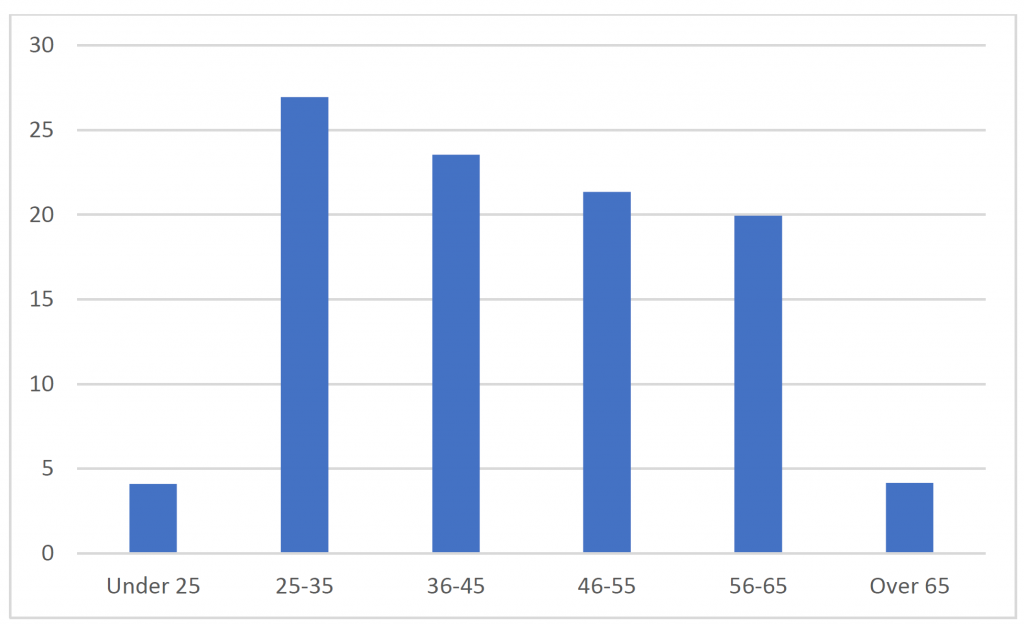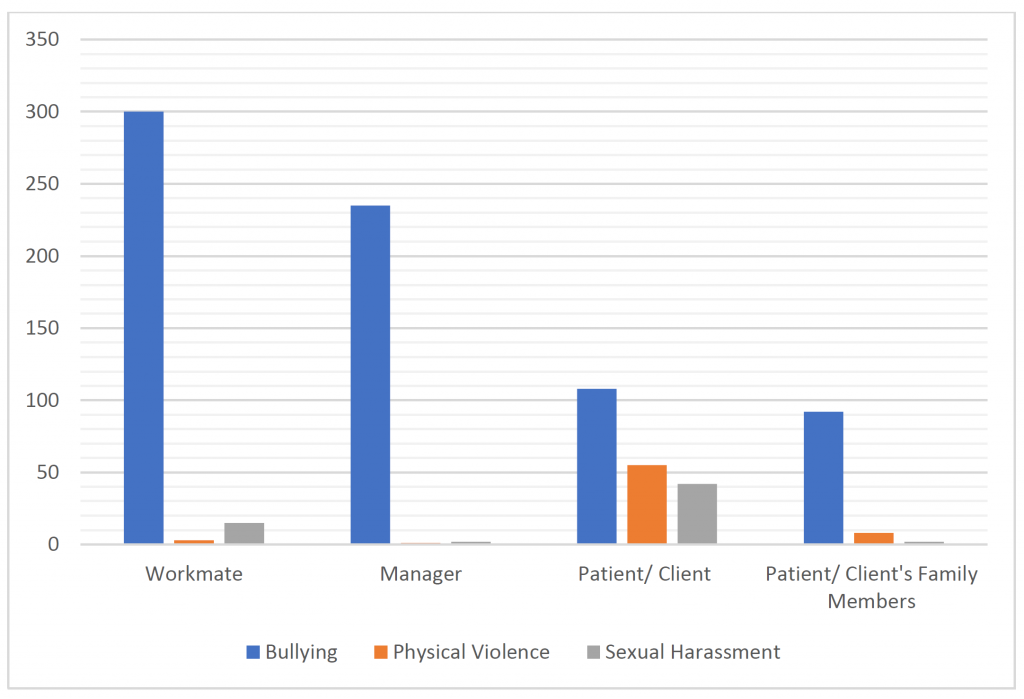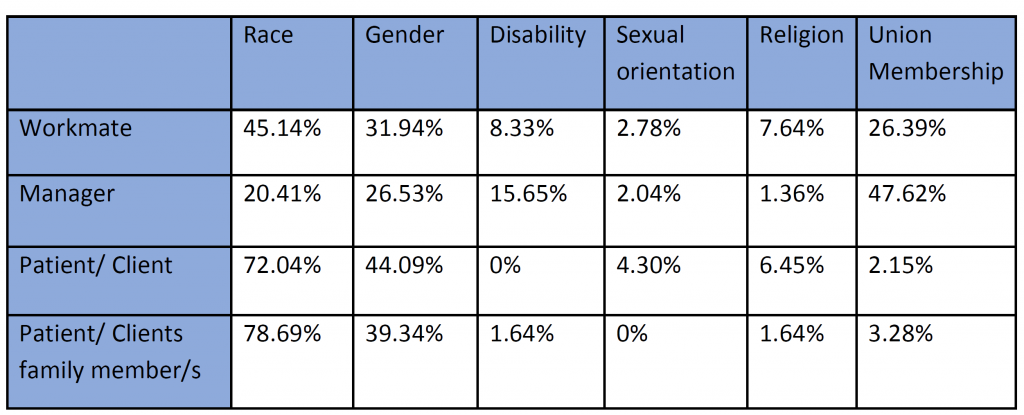First of all, thanks to all of you who completed the demographic survey. The survey has highlighted some issues that were not on our radar at all, for instance the level of age discrimination members are experiencing. Other issues we were aware of such as merit progression nonetheless raised components that were also “news to us” and certainly warrant further investigation.
Not all the news was good: the level of bullying and racial/gender discrimination members experience from co-workers behooves us to look to ourselves to ensure we have done everything we can to make our workplaces better. Discrimination on the grounds of Union membership by contrast, is a serious issue we need to address with our employers.
What follows is a brief summary of the main findings of the demographic survey and plans we already have to improve matters. Further issues we will need to get onto going forward have been put into a planning phase, so watch this space on these fronts.
We trust you find the following as enlightening as we did and that it provides a sense of prioritization. Further feedback is welcomed as always; please email us at secretary@apex.org.nz if you wish to share further thoughts.
The Figures at a Glance
- 2,006 members responded to the survey: 82.5% Female, 17% Male, 0.5% gender diverse
There were a larger proportion of males among the Anaesthetic Technicians, Biomedical Engineers, Medical Physicists, Perfusionists and Scientific Officers. This is consistent with the overall gender distribution among whole of allied scientific and technical practitioners.
- The age of respondents was as follows:
Merit Progression
- 20% of members (no gender distinction here) applied for merit in the past 2 years; 38% were successful in that application.
- Among those who applied for merit progression, females were more likely to receive a merit step increase at a success rate of 43.46% compared to males 33.79%
- Some members reported missing opportunities for progression within their roles due to their choice to have children. We also found that there was less success among part time employees.
- A significant number of those who responded to the demographic survey commented that they felt that merit step progression is mishandled by management and is a biased process.
APEX had already identified merit progression as a key issue for 2020. That females appear more likely to be successful was a surprise to us and warrants further investigation. That part timers and those in child rearing years appear to be discriminated against in this regard, is also something to be addressed.
Overall the process clearly needs improvement, however we were none the less pleased to see that at least 1/3rd of those who applied were successful. Are they somewhat self selected?
Expect a further survey to drill down further on these issues among others. A “Think Tank” on merit progression is also to be established among a group of delegates and advocates to plot a way forward.
The main reasons that were identified for not applying for merit step progression were:
- Unawareness of merit step and unclear criteria;
- Difficult process, time consuming, additional requirements, long time getting feedback;
- Employer misinformation, told “not good enough” or “won’t get it” or “don’t meet criteria”;
- A belief that “I can’t go any higher”;
- Private employment;
- Not eligible, new grad, intern or employee.
The main reasons identified for not being successful in applying for the merit step progression were:
- That the requests were entirely mismanaged;
- That the employer did not find a reason to warrant the increase;
- No further progression available through the steps;
- Not enough time as it is a lengthy process;
- Management was not stable for it to be appropriately considered;
- Told that it is not available.
Inappropriate Behaviour
- 61% of members had experienced bullying, physical violence and/ or sexual harassment in the last 2 years.
- Workmates and managers were the most frequent perpetrators of these behaviours however the distribution was variable.
Workstreams on bullying and violence at work are already underway. A national Hui precipitated following our interview on TV3’s Breakfast show late last year, is scheduled for later this month.
Further resources for members are also underway, so we can better identify inappropriate behaviour including sexual harassment and suggest practical means by which intervention can occur.
Number of Employers
- 47% of females worked 1 FTE for one employer whereas 74.71% of males worked 1 FTE for one employer.
- Overall 85% of respondents worked 0.6FTE or more and 72% worked 0.8FTE or more. Amongst those who work for 2 employers, the majority worked 0.6 FTE and above for the one employer with a secondary employer of 0.4 or less FTE.
Discrimination (Managers and Workmates)
- Managers were not reported to discriminate on the basis of sexual orientation but 7.14% of male respondents reported this form of discrimination from workmates.
- Managers were over-represented however in discrimination on the basis of Union membership/affiliation. Nearly half of respondents reported discrimination based on union membership from managers.
- 45% of members reported discrimination from workmates on the basis of race and 20% from managers.
- Religious discrimination was uncommon but almost solely from workmates and patients.
- Discrimination on the basis of disability: 16% from managers which was a surprise and 8% from workmates.
- We identified from the comments that there was a high proportion of discrimination on the grounds of age, either by being not old enough or too old, or of childbearing age.
- Those who responded to the demographic survey also reported being discriminated against on the basis of being pregnant, or on maternity leave. One member recalled be told they were not successful for receiving a training position because they were of childbearing age.
- And finally, 27% of respondents experienced discrimination from managers based on gender and 32% from workmates.
Discrimination (patients, family and whanau)
- a whopping 2/3rd of respondents experienced racial discrimination from patients, family and whanau and 30% experienced gender discrimination regardless of gender.
- Patients, family and whanau were not reported to discriminate on the basis of disability, union membership, with low levels of discrimination on the basis of religion (5%) or sexual orientation (although of what there was, male respondents experienced more of this than their female colleagues).
We intend to bring the issue of discrimination on the basis of union membership, disability and age to our employer’s attention for discussion and appropriate remedial action.
The level of racial and gender discrimination is very disappointing and something we must all be aware of and work to eliminate. It may also unfortunately be a reflection of our society as a whole. Nonetheless, means by which we can do our best to tackle this issue are being explored. Perhaps the first step is to acknowledge that we do have a problem?
Source of Income over Base Salary
Income derived from overtime suggests most of the respondents work at least 3 hours overtime a fortnight however the number on call far exceeds this. On call is more disruptive to an employee’s life for little financial reward unless called in however the following figures suggest some of our membership are getting called in a great deal.
Fatigue is a topic on the National Agenda this year with a national fatigue working group established and of which we are members. MITs have taken a lead with a fatigue matrix as part of their recent settlement. This is a system that assesses the fatigue risk on a roster and provides a means to minimise that risk including swapping on call, for shift systems. Monitoring the impact on earnings over base salary and addressing incentives and reward through collective bargaining will be important in this environment. The above will act as a baseline for us going forward.
Access more APEX resources here.




